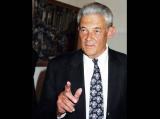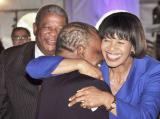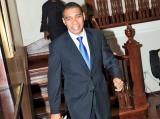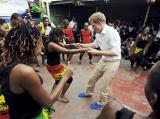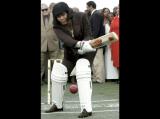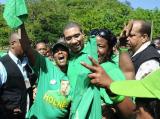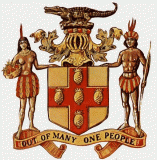Columns By Category
Popular Articles
- THE REALITY OF TACKY AND SAM SHARPE
- PLEASE DON’T BETRAY US AGAIN POLITICIANS
- CRY, MY MURDEROUS COUNTRY
- MODERNIZING THE PNP: VERSION.2020
- IS THE EXCHANGE RATE ON TARGET OR IS IT A WHOPPER?
- CARICOM: BEACON OF DEMOCRACY OR COWARDLY DISGRACE?
- DEMOCRACY PREVAILS IN THE UNITED STATES
- THE CRIME STATISTICS SPEAK FOR THEMSELVES
- PETROJAM, OIL PRICES, AND THE $7 TAX
- Kevin O'Brien Chang | Brains, not brutality – smart(phone) crime fighting
- TERRORISM IN JAMAICA
- STOP CURRENCY CRISIS TALK
- 'CASTIGATED KD' AND THE 9 YEAR WONDER
- GET PAST MERE TALK ON DONS AND GARRISONS
- LOW VOTER TURNOUT MYTHS AND ELECTION PREDICTIONS
- HOW GREAT CAN BROGAD BE?
- PNP WAS SOCIALIST FROM THE START
- AN AGE AND GENDER RE-ALIGNMENT ELECTION?
- Most influential Jamaican of 2010-2019?
- NO GAYLE, NO RUSSELL, NO TALLAWAHS
Politics
Michael Manley - Number 10 on my greatest Jamaican list
- Article
- July 23, 2012
- No comments
WHY 'TOP 10 greatest Jamaicans'? Well, why not? Fifty years of Independence is a long enough time to reach some agreement about which of this country's sons and daughters have fought for justice and equality, and giving Jamaicans pride in themselves as a people. And is this not a reasonable definition of greatness?
It's not too late, Portia!
- Article
- June 5, 2012
- No comments
Peter Phillips' Budget speech accepted Jamaican and international realities - the cupboard is indeed bare! Yet it's possible to do the right thing in the wrong way, as the angry public reaction is proving. When both the poor and rich are bashing you, something is amiss.
Populist or stateswoman?
- Article
- April 15, 2012
- No comments
CAN PRINCE ANDREW LEARN FROM QUEEN PORTIA?
- Article
- April 1, 2012
- No comments
3 MILLION-PLUS CHEERS FOR THE QUEEN
- Article
- March 11, 2012
- No comments
"Puma on track for millions of pounds' worth of free publicity as images of Prince Harry posing with Usain Bolt go global." - The Guardian, March 7, 2012
Well, however much that tiny logo on Harry's shirt earned Puma, it cannot be close to the windfall that big Jamaica on his chest brought to this country. No doubt the picture and video of King Usain and the Prince doing 'the arrow' will also be a poster child for the 2012 London Olympics.
The entire Jamaican tourist industry must be grinning ear to ear, and those myopic 'stop waste the $3 million pon white man colonialist and feed poor people' grandstanders must feel rather foolish now.
Big Shot, Portia!
- Article
- February 26, 2012
- No comments
At last, someone with clout has stood up for us long-suffering West Indies fans. God only knows why the previous administration so ignored an issue so dear to the hearts of so many - it certainly was not because of a lack of complaints from those who care.
But better late than never, and Prime Minister Portia Simpson Miller's firm presentation of the facts has finally brought to the fore the issues strangling cricket around the West Indies, and especially in Jamaica.
Cricket in this country has never been at a lower ebb. Crowd attendance at schoolboy and club cricket is virtually non-existent. At regional matches, gatherings of over 500 are now considered 'large'.
Can Portia Be Jamaica's Lula?
- Article
- January 8, 2012
- No comments
The global financial recession is battering incumbents everywhere. In the last two months, the governments of Slovenia, Croatia, St Lucia and Spain have been booted, those in Guyana and Russia lost their 50 per cent majorities, and those in Greece and Italy resigned to avoid electoral humiliation. Only strong commodity-export economies like New Zealand have bucked the trend.
Every English-speaking Caribbean election since 2010 has seen a big anti-incumbent swing.
CELEBRATING DEMOCRACY - JAMAICAN STYLE
- Article
- December 18, 2011
- No comments
First, some clarification is in order. In his December 11 Gleaner column, 'Duppy polls, obfuscation, ignorance and simpletons', Bill Johnson wrote, in reference to my December 4 Gleaner article titled 'Political polls and PM promises':
"Let me make it perfectly clear: the 2002 poll prominently cited by Chang in his column as mine was not conducted by me, if, in fact, it was conducted by anybody at all."
Political polls and PM promises
- Article
- December 4, 2011
- No comments
Bill Clinton allegedly remarked that "politics is about polls and focus groups", and it certainly worked for him. Mr Clinton's research-based ability to 'feel their pain' created a bond with the American people that even Monica Lewinsky never broke, and he remains the most popular president since Ronald Reagan.
Whether his Jamaican counterparts take such a scientific approach to politics, I can't say. One problem is that our pollsters are few, and have a mixed record. The Stone polls were extremely accurate for every general election between 1976 and 1997, but went astray in 2002.
Dreaming of a New Jamaica
- Article
- November 20, 2011
- No comments
All political lives, unless they are cut off in midstream at a happy juncture, end in failure, because that is the nature of politics and of human affairs. - Enoch Powell
Powell was probably right in a short-term sense. Democratic political careers are usually ended by death, illness, scandal-driven resignation, term limits, electoral defeat, or impending defeat. An elected leader voluntarily stepping down while basking in glory as voters beg him to stay is a vanishingly rare sight.

